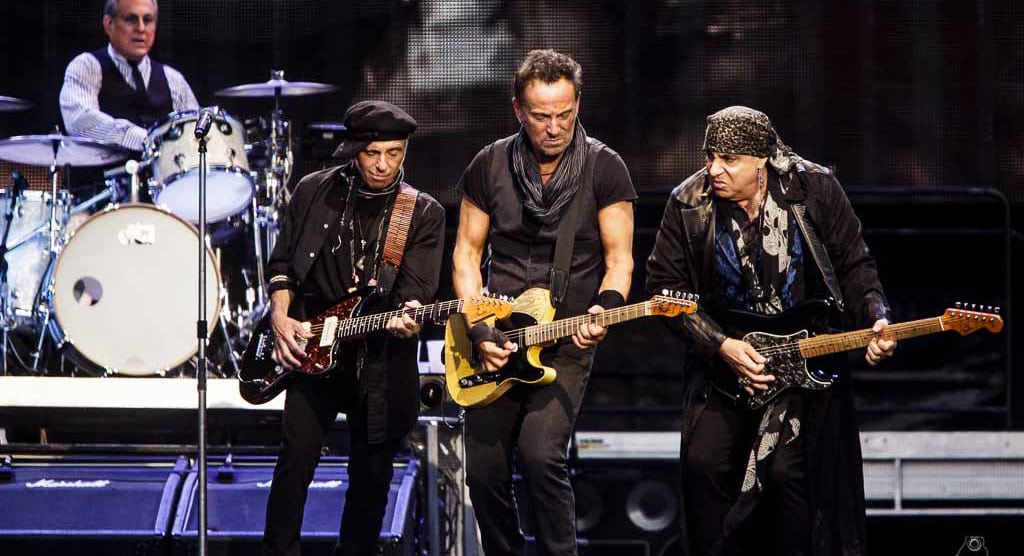Worship and hope on tour

Music does have an amazing power to stir and to unite
But ultimately the worship is idolatrous and the hope unfounded.
On a quiet Saturday evening at home, I was pleasantly surprised to see a brand-new Bruce Springsteen tour documentary, Road Diary, appear on Disney Plus. Being a lifelong fan (who can’t quite justify live ticket prices nowadays), I thoroughly enjoyed watching it from start to finish. The fading autumn light outside added to the reflective atmosphere.
The documentary offers insights into the history of Springsteen’s band, the E Street Band, and features clips of them practising and performing. It’s not quite the same as attending a concert or even watching a full-length concert video, as you only get song segments interspersed with interviews. Yet, for those who appreciate his music and enjoy discovering more about the band members, it’s well worth a watch. I especially loved seeing the contrast between the motorhome they once squeezed into on early tours and the complex logistics supporting their tours today.
Two themes struck me particularly as I watched:
Spiritual Worship
The language surrounding the concert experience strongly resembled that of collective worship. Both musicians and audience members described it as a ‘spiritual experience’ – phrases like ‘this is our church… this is my community’ resonated throughout. For Bruce and the band, there was something deeply validating, something that gave them a sense of worth and meaning. There was a palpable shared emotion among them, a sense of connection to something transcendent beyond themselves.
Bruce himself only speaks occasionally, serving mostly as a narrator. At one point, he remarks, ‘Playing live is a deep, lasting part of who I am.’ He ends the film with a quote from the late Doors singer, Jim Morrison: ‘O great creator of being, grant us one more hour to perform our art and perfect our lives.’
It saddened me to think that this experience was the height of their spiritual journey – rather than worshipping the true and living God. It prompted me to reflect on our own worship services: do we sometimes aim for emotional highs similar to those in a Springsteen concert? At the same time, it challenged me to consider whether our gathered worship might feel comparatively mundane, less charged with emotion. Have we, in some way, made the extraordinary ordinary?
Unfounded Hope
Most of the band members are now in their seventies, taking on the gruelling task of three hours of intense performance – more than I’ll likely manage at that age! The documentary includes stories of band members and friends who have passed away, reflected in some song choices and the overall setlist. In these moments, they attempt to come to terms with mortality while searching for hope: hope that life somehow continues, that they will be reunited on ‘the other side’ or perhaps in dreams.
The song ‘I’ll See You in My Dreams’ captures this yearning:
I’ll see you in my dreamsWhen all our summers have come to an endI’ll see you in my dreamsWe’ll meet and live and laugh againI’ll see you in my dreamsYeah, up around the river bendFor death is not the endAnd I’ll see you in my dreams
But as moving as these lyrics are, I felt a lingering sadness; from what I can see, there’s no real foundation for that hope. One day, the stage will fall silent, and they will be forgotten.
We might not be able to produce an event as charged as even the most understated Springsteen concert. But we have a hope that does not disappoint. The connection Springsteen longs for in these songs – that relationship with our Creator and the reunion with loved ones – is found in Christ and in his church.

Bruce Springsteen:
Hi Graham, No musician in the history of music has highlighted the plight of the American blue collar worker quite like Springsteen.
Not only is he the greatest ever live act, his songwriting skills are only surpassed by those of Bob Dylan.
Thank you Eddie Sanders
Personally, I agree with you as I am a fan and I have seen both of them live. Others may have different preferences. Still, without Christ it all turns to dust.
For many years, Olympic triple jump champion Jonathan Edwards claimed his athletic career would have been pointless without his faith in Christ.
In 2008, he shocked the world by announcing he no longer believed in God. Edwards says his atheism made him happier than his belief in Jesus.